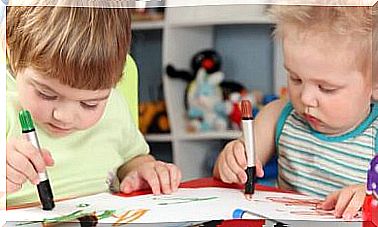Dealing With Children’s Fear

Fears can overwhelm our children, sooner or later. That’s why we must know how to act in the face of children’s fear in order to use mechanisms that help to recognize when, in fact, they are going through a risky situation or when they are afraid of their age-appropriate fantasies.
Children’s fear is usually temporary and changeable. This experience, however unpleasant, is part of your growth. Every human being needs to identify the moment when fear is manifested in order to face it and finally overcome it.
Being aware of our children’s fears and the reasons behind them is a full-time job for mothers. It is very important to actively participate with our children to identify fears and address them using various tools that allow us to minimize or completely destroy them.
Children’s fear must be dealt with positively and assertively, otherwise it can turn into a more complex problem, such as phobia.
When children are young they are more vulnerable and are afraid of things or circumstances. As they grow up, they become more independent and less prone to fear.
Reasons why children are afraid
Children always have a desire to get to know the outside world, and sometimes the results are “not at all pleasant”, which causes fear.
Fear can be the result of elements or events that occur in the environment where our children usually develop to do their routine activities (school, places of recreation, home, etc…)
No person is exempt from experiencing negative situations or elements that cause them fear. That’s why we must be empathetic to understand our young child and be able to help him by giving him the information he needs to act sensibly in any event that upsets him.
Generally, anything that is different and unexplored by our children can trigger “children’s fears”, as not knowing how to face these situations makes them feel vulnerable and, as a result, creates a lot of tension.
Advice for dealing with fear of children
- Knowing where fear comes from and how it works will make it easier for you to deal with the situation.
- Analyzing the size of the fear that disturbs them is important to be able to make corrections or ask for help from a professional.
- Show understanding. You must reach out, hug him and protect him, and give him love. Then he will understand that if you are not afraid, there is nothing to fear.
- Giving information, explaining how you should face situations, when you should be prudent and demonstrating why there should be no fear or irrational, will lead you to calm down in the moment of tension.
- Facing the situation: gradually intervene in the problem, making it face it. Depending on the situation, demonstrate that nothing serious will happen and encourage him to try to face it together with you (if the situation poses no risk for both of you, of course).
- Educate him so that he understands when it is necessary to be prudent in the face of potential danger. This should be very well explained without creating any kind of alarm. It is not about eliminating fears, but about working and controlling them under certain circumstances.
- Avoid externalizing our own fears in front of our child in order not to add more negative charge to the situation. It is important to remember that the mother figure to a child represents security, confidence and, to some extent, invincibility.
- Books, movies and conversations should be adequate. Avoiding contact with themes such as terror and violence is a good measure to reduce this type of situation.
- We must never minimize your fear: underestimating or deceiving your feelings increases your vulnerability.
- Talking openly about the things that frighten you, eg that monsters or witches are inventions is highly recommended, knowledge to help you distinguish reality from fantasy is vital to structuring life.
If, despite having used all the measures mentioned here, your young child still has continuous episodes of fear, depending on their frequency and intensity, it will be necessary to consult a specialist so that he can assess the situation and use specific therapies for the case.









